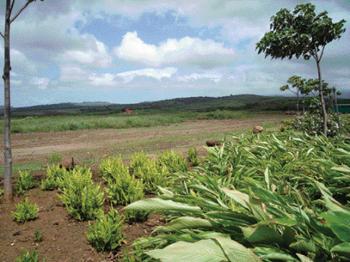LIHU‘E — Gettin’ down and dirty. Would-be green thumbs and prospective farmers have shied away from growing their own food in recent years, hesitant to get their hands in the soil. But it’s really not that difficult and “you can
LIHU‘E — Gettin’ down and dirty.
Would-be green thumbs and prospective farmers have shied away from growing their own food in recent years, hesitant to get their hands in the soil. But it’s really not that difficult and “you can wear gloves,” said Glenn Hontz, coordinator and director of the Food Industry Program at Kaua‘i Community College, with a chuckle Thursday morning.
One of the biggest misconceptions in the agricultural world is that gardening is hard and people give up as soon as they unsuccessfully attempt to cultivate their own food. This idea has been rampant for a long time on Kaua‘i, Hontz said.
Therefore, in an effort to expand the island’s food industry awareness, KCC is gearing up for another round of training programs starting in September. Spearheaded by Hontz, the courses aim to inspire careers in farming, as well as increase production of locally grown food.
“More training means more farmers, and more farmers means more food,” he said.
Entrepreneurship is one of the many series being offered next semester with classes such as managing, financing, business planning and development.
“Business training is much more important than farmers will admit,” Hontz said.
According to the U.S. Department of Agriculture, a major cause of farm failure is lack of savvy business skills.
The programs offered at KCC not only cater to commercial farmers, beginner programs are offered as well.
If more people grew their own food, the endeavor would ultimately help decrease the island’s dependence on imported products and oil, said Dr. Larry Magnussen, a graduate of KCC’s food industry program who lives in Lawa‘i.
Magnussen will be one of the instructors for the upcoming year and said growing food on Kaua‘i is necessary for continued survival, as the island only sustains about a seven- to 10-day supply of food at any given time.
Another graduate and teacher of the food industry program is Arius Hopman of Hanapepe, who said not only is food independence a possibility, but organic food growth using minerals and “soil amendments” is easily achieved on an island where they are naturally abundant.
“For a century, we’ve been plowing for sugarcane and pineapple,” he said, providing one reason for depleted soils.
However, many of the minerals, like black sand, which was washed away over the years, remain at mouths of rivers and adjacent beaches.
Hontz agrees that organic, natural resources are abundant on Kaua‘i and says the shipment of chemicals and fertilizers is entirely unnecessary.
“We can produce our own fertilizer and soil amendments on our island,” he said, citing the ancient Hawaiian’s ahupua‘a sustainable system of land management as an example.
The system divided the island into separate districts — from the mountains to the sea — each with a unique biodiversity. This could be used as a model, along with new technologies, to re-build self-sufficiency, ultimately bringing business, economic and food security back to Kaua‘i, sources said.
“What we’re trying to do is to get people to change their pace from McDonald’s and fast food to fresh food and vegetables,” said Neil Brosnahan of Kalaheo, who is in the process of organizing a community garden at the Kalaheo Neighborhood Center. “If we can get people out of eating greasy fast food and into fresh food, maybe they will get interested in the industry.”
Developing a modern food industry in a sustainably “green fashion” would also allow businesses to become more profitable in the long run, Hontz said.
Businesses that don’t take the environment into consideration end up “shooting themselves in the foot,” he said.
“There are many farmers — lifelong farmers — who want to retire someday, but their children have chosen different paths and won’t be taking over their farms,” said Mayor Bernard Carvalho Jr. at the Kaua‘i Economic Development Board’s Agricultural Summit last month. “I’ve talked to these farmers and I know they are worried about the future of ag.”
For more information, contact Hontz at hontz@hawaii.edu or 246-4859.


